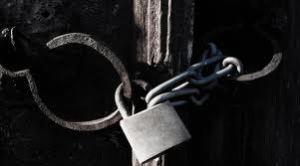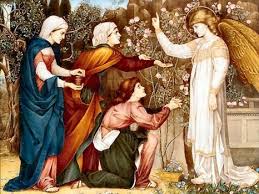On the evening of the first Easter, we find the disciples of Jesus cowering together in a house. Windows shut, shades pulled, curtains drawn, shudders closed and the doors have been locked up tight. It is nighttime, a dangerous time in any city, but this is Jerusalem, and here, on this night, the disciples had some pretty good reasons to lock the doors.
The most obvious reason their doors were locked was the fear that the institutional, religious authorities who organized and began plotting from the very beginning to put an end to Jesus and his message were quite possibly even now plotting to put an end to them.
So the disciples locked the doors.
And then, there may be another reason, earlier in our text we read where Mary Magdalene has told them, “I have seen the Lord.” And what do they do? They locked the doors.
After denying that he even knew who Jesus was, I’m sure Peter felt like locking the doors. After fleeing and deserting Jesus, leaving him to die alone between two thieves, I’m sure many of the disciples felt like locking the doors.
This image of locked doors has had me thinking all week. As I have pondered this image, I cannot get the words of my home pastor out of my mind. Every Sunday, during the Invitation, he always said the same words: “The doors of our church are now open for membership. If anyone here would like to be received into full membership into our church, you are invited to come down during the singing of this hymn.
Remembering these words this week has caused me to ask a question, a question that I believe is imperative for the church in the 21st century to ask: “Why do you suppose so many people today, especially people in their 20’s, 30’s, and 40’s, when it comes to church membership, also feel like locking the doors, locking the doors to even the thought of becoming a part of the church?”
From asking this question to countless people all over this country who have given up on the church since I was ordained in 1992, this is what I have discovered:
The reason that most young people give for locking the doors to even the very thought of being associated with the church is that they simply have no trust in organized, institutional religion. In fact, they regard the church the same way the disciples cowering behind closed doors regarded the religious system of their day—as a threat to Jesus and everything for which Jesus stood.
They hear some of their friends, the ones who do proudly profess to be a part of a church, on a tirade protesting against such things as equal rights, social justice, equitable healthcare, and any criticism about the gap between poor and the rich. They hear their church friends make scornful remarks about minorities of every persuasion, and they know just enough about Jesus and his affinity for the poor and the marginalized to know that something is terribly wrong with this picture.
Many young people today in no way want to be associated with the words of many in the church who make heinous claims on the behalf of God, such as: tornadoes are God’s way of getting our attention, the Haiti earthquake as well as Hurricane Katrina were directly linked to Voodoo or Catholicism; the Japan earthquake and tsunami and the South Asia tsunami were directly linked to Buddhism or Islam; or the events of 9-11 and the subsequent deaths in the War on Terror are God’s judgment on abortionist and homosexuals.
Young people today do not want to be associated with a religion that has preachers and congregations who picket the funerals for our soldiers who paid the ultimate sacrifice, yelling hate-filled rants declaring that their deaths are the will of God.
They hear preachers declare from their pulpits that either the American President or the Pope is the anti-Christ. And they look at institutional, organized religion these days and think that we may be the ones who are anti-Christ. So, like the disciples distancing themselves from self-righteous and judgmental organized religion, young people are locking their doors to the church.
And secondly, as the disciples also hid behind locked doors avoiding Jesus, there are some who are not simply avoiding organized religion; they are avoiding God. When they lost their grandparents, their parents, or some, their children, the response from their Christian friends was that God took them. God needed another angel, another flower in the heavenly garden.
The response of some in the church was that all of their loved one’s pain and suffering and their subsequent death, that their child’s untimely and tragic death was all part of some purpose-driven divine plan. So they lock the doors, wanting absolutely nothing to do with a God like that.
Whatever the reason for the disciples’ fear, the irony of our gospel lesson is that the judgmental, organized religious authorities were not trying to get to the disciples to arrest them and Jesus was not trying to get to them to punish, condemn them or take their lives. As I said at the Sunrise Service last week, Jesus was trying to get to the disciples in order to give them the word that they needed more than any other word—the very first word of the Easter story.
On Easter evening, the Risen Christ returns to his disciples, the same fearful followers who denied, forsook and abandoned him and pronounced “Peace!” It was the same word that was proclaimed at his birth by the angels in the beginning of the gospel. “Glory to the God in the highest and on earth, peace!” And it was one of the last words from the cross when he said, “Father, forgive them, for they know not what they do.” And here, the first word of Easter to the fearful disciples cowering behind locked doors is “Peace.”
THIS is what I believe all people need to hear from the church, and it needs to be the very first word they hear from us.
The first word they hear from the church should never be judgment, condemnation or some loud, angry, hate-filled rant or protest. It should never be that God took her or snatched him, or is punishing them, or trying to get their attention because of some sin. No, the first word they need to hear from us is “peace.” They need to hear God say, “Peace. My peace I give to you. You are my sons. You are my daughters, I have always loved you. I still love you. I will love you forever. I am here with you and for you, always working all things together for the good.”
I believe people in our world who have locked their doors to the church are thirsting for this peace. They are thirsting for a group of people in our world that have the audacity to truly live as the embodiment of Christ in this world offering the first word of Easter, the peace of Christ to a fearful world through selfless, sacrificial love and service to others. They are thirsting for a church that seeks to be, not an institution, but the living embodiment of Christ in this world, serving the poor, and those whom society has marginalized, offering grace, acceptance, love and peace.
Several Easters ago, we went to visit my parents in Elizabeth City. We had a nice dinner, watched the Masters, and then ate some leftovers before heading home. It was late when we arrived back home, about 11:00. And guess what? We were locked out. In a hurry to leave after church, I had accidentally grabbed the wrong set of keys.
As Lori and Sara sat in the car, twelve year-old Carson and I checked every window on the first floor. All locked. “I guess I’ll break a window.”
“Wait a minute,” Carson, who has always had a lot more patience than me, said. “I think the window in the middle dormer upstairs is unlocked.” I grabbed my extension ladder that was much too short for the job. I stood it almost straight up and asked Carson to hold it at the bottom as I climbed up. Got myself on the roof in front of the dormer, but before I could reach it, because of the pitch of the roof, and the dew that had gathered, I began to slide off. Came down, feet hit the ladder, almost knocking it over. I put a death grip on my shingles with my hands. Grabbed the top of the ladder with one foot and straightened it out with the other as Carson helped at the bottom. I don’t know if he was more scared that I was going to fall and kill myself on the brick steps below or fall right on his head.
After one more idiotic try to climb on the roof, it occurred to me, “Maybe I can peel the vinyl ceiling back on my back porch just enough to climb up into the attic. Got my pry bar, and went to work. Less than five minutes later, I was inside.
Now, was my wife happy? Was I the hero of the night? Was she proud of my resourcefulness and my persistence? No, she was absolutely horrified by how quickly I broke into our securely locked house. “If a preacher can break in, anyone can!” she said.
This is the good news of this Easter Season. Our securely locked doors are not a problem for Jesus. Here is the promise of Easter for each of us today. Just as the risen Christ was not stumped by the locked doors behind which the disciples cowered, so I promise you that the risen Christ will not be deterred by the locks that any of us or anyone else has put on our own doors. Our God is wonderfully resourceful, imaginative, persistent, and determined to get to all of us. Even in our lostness, even in our betrayals and denials, even with all of our past failures, Christ is ever determined to share his peace with us in this world.
I believe Christ is as alive today as he has ever been. I believe he is on the loose, even here in Farmville. He is moving and working and he is as determined as ever to get the word out…the very first word of the gospel proclaimed by angels, and the last word proclaimed on the cross and the first word of Easter: peace. The question is: will he be able to use us? Will we allow him to breathe the Holy Spirit on us and send us into the world to help him share that word—a word of unlimited grace, unreserved forgiveness and unconditional love for all God’s people, especially to those who have locked the doors to the possibility of being a part of the church.
Will he find a group of people here that have the audacity to truly live as the embodiment of Christ in this world offering the first word of Easter, the peace of Christ to a fearful world through selfless, sacrificial service to others?
From what I have learned about you over the last seven months, and from what I what I see in you every week, I believe the answer is ABSOLUTELY!





 Sometimes it seems odd to call this week “Holy.”
Sometimes it seems odd to call this week “Holy.”